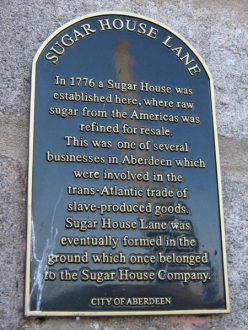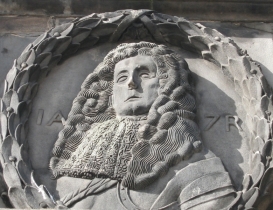With thanks to Mike Shepherd.
Peter Williamson was kidnapped from Aberdeen harbour in 1743 and shipped as a child slave to the American colonies. Following the death of his master, he married into a wealthy family and set up a farmstead on the frontiers of the province of Pennsylvania.
On the 2nd of October 1754 his farm was raided by Indians, set ablaze and Peter was captured and used as a slave by the Indians to help carry booty from their raiding expeditions.
After two months in the winter camp, the Indians set off with Peter on a new raiding campaign.
“I began to meditate on my escape; and though I knew the country round extremely well, having been often thereabouts with my companions, hunting deer and other beasts, yet was I very cautious of giving the least suspicion of such my intention. However, my keepers thought proper to visit the mountains in search of game for their sustenance, leaving me bound in such a manner that I could not escape. At night, when they returned, having unbound me, we all sat down together to supper on two polecats, being what they had killed, and soon after (being greatly fatigued with their day’s excursion) they composed themselves to rest as usual.
Observing them to be in that somniferous state, I tried various ways to see whether it was a scheme to prove my intentions or not; but after making a noise and walking about, sometimes touching them with my feet, I found there was no fallacy. My heart then exulted with joy at seeing a time come that I might in all probability be delivered from my captivity, but the joy was soon damped by the dread of being discovered by them, or taken by any straggling parties. To prevent which, I resolved, if possible to get one of their guns, and if discovered die in my defence rather than be taken. For that purpose, I made various efforts to get one from under their heads (where they usually secured them) but in vain.
Frustrated in this my first essay regarding liberty, I dreaded the thoughts of carrying my new design into execution; yet after a little consideration, and trusting myself to divine protection, I set forward, naked and defenceless as I was. A rash and dangerous enterprise!
Such was my terror, however, that in going from them I halted and paused every four or five yards, looking fearfully towards the spot where I had left them, lest they should awake and miss me; but when I was about two hundred yards from them I mended my pace, and made as much haste as I could to the foot of the mountains, when on a sudden I was struck with the greatest terror and amaze at hearing the wood-cry, as it is called, and may be expressed – Jo hau! Jo hau! – which the savages I had left were making, accompanied with the most hideous cries and howling they could utter.
The bellowing of lions, the shrieks of hyenas, or the roarings of tigers, would have been music to my ears in comparison to the sounds that then saluted them.
They now having missed their charge, I concluded that they would soon separate themselves and hie in quest of me. The more my terror increased, the faster did I push on; and scarce knowing where I trod, drove through the woods with the utmost precipitation, sometimes falling and bruising myself, cutting my feet and legs against the stones in a miserable manner, but though faint and maimed, I continued my flight until break of day, when, without having anything to sustain nature but a little corn, I crept into a hollow tree, in which I lay very snug and made thanks to the Divine Being.
But my repose was in a few hours destroyed at hearing the voices of savages near the place where I was hid, threatening how they would use me if they got me again. However, they at last left the spot where I had heard them, and I remained in my circular asylum all that day without further molestation.
At night I ventured forward again, frightened and trembling at every bush I passed, thinking each twig that touched me to be a savage.”
After three days on the run he spotted what looked to be a white plantation.
“In the morning, as soon as I awoke, I continued my journey towards the nearest cleared lands I had seen the day before, and about four o’clock in the afternoon arrived at the house of John Bell, an old acquaintance, where knocking at the door, his wife who opened it, seeing me in such a frightful condition, flew from me like lightning, screaming into the house.
This alarmed the whole family, who immediately fled to their arms, and I was soon accosted by the master with his gun in his hand. But on my assuring him of my innocence as to any wicked intentions, and making myself known (for he took me to be an Indian), he immediately caressed me, as did all his family, with a deal of friendship, at finding me alive, they having all informed of my being murdered by the savages some months before.
They for two or three nights very affectionately supplied me with all necessaries, and carefully attended me until my spirits and limbs were pretty well recruited, and I thought myself able to ride, when I borrowed of these good people a horse and some clothes, and set forward for my father-in-law’s house in Chester county, about 140 miles from thence, where I arrived on the fourth day of January, 1755.
Now returned, and once more at liberty to pursue my own inclinations, I was persuaded by my father-in-law and friends to follow some employment or other; but the plantation from whence I was taken, though an exceeding good one, could not tempt me to settle on it again. And their being at this time a necessity for raising men to check those barbarians in their ravaging depredations, I enlisted myself as one, with the greatest alacrity and most determined resolution to exert the utmost of my power in being revenged on the hellish authors of my ruin.
General Shirley, governor of New England, and commander-in-chief of his Majesty’s land forces in North America, was pitched upon to direct the operations of war in that part of the world.
Into a regiment immediately under the command of this general, was it my lot to be placed for three years. The regiment was intended for the frontiers, to destroy the forts erected by the French.”
From: Peter Williamson “The Life and Curious Adventures of Peter Williamson, Who was Carried off from Aberdeen and Sold for a Slave”. York, 1757.
To be continued.


